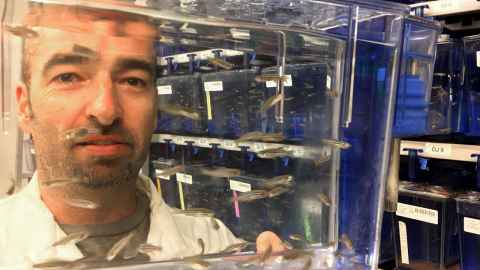Tiny fish leading the way in a cure for gout
28 March 2018
A popular aquarium fish that grows no longer than 4 cm could provide the breakthrough in treating and preventing extremely painful attacks of joint inflammation that are a key concern to patients with gout.

Gout is the most common inflammatory arthritis in Aotearoa/New Zealand. Inflammation associated with it leads to extreme pain, disability and poor health related quality of life. At present there is a clinical need for new anti-inflammatory treatments for gout as current therapies have limited success.
Acute gouty inflammation is triggered when urate crystals build-up in and around joints, activating the immune system and causing extreme joint inflammation and pain. Because this inflammation occurs in the joints under the skin, researchers have traditionally relied on examining tissue samples that only provide a static ‘snapshot’ of the disease process.
This work directly addresses an unmet need to find new ways to treat the debilitating inflammation associated with gout.
Utilising highly specialised microscopy, researchers at the University of Auckland have exploited the transparency of tiny zebrafish embryos to make dynamic movies of the immune system responding to urate crystals, for the first time within a whole animal.
Dr Chris Hall of the University’s Faculty of Medical and Health Sciences lead the study (recently published in the high impact journal The Journal of Clinical Investigation) with several of his colleagues, including Professor Nicola Dalbeth, an academic rheumatologist in the faculty and an internationally recognised expert in gout research.
“Through this approach we have uncovered a previously unrecognised mechanism through which the immune system responds to urate crystals to drive inflammation,” Dr Hall says.
“We have also shown that our discovery translates to the human disease and that blocking this mechanism of immune cell activation represents a new strategy to alleviate gouty inflammation. This work directly addresses an unmet need to find new ways to treat the debilitating inflammation associated with gout.” Dr Hall says.
Dr Hall says the study is of particular significance to Aotearoa/New Zealand, as Māori and Pacific people have the highest prevalence of gout worldwide.
This work also recently received funding from the Health Research Council of New Zealand in the 2017 funding round to exploit these new findings and identify new anti-inflammatory treatments for gout.
Media queries
Anna Kellett | Media Relations Advisor
Tel: 09 923 9336
Mob: 027 838 9202
Email: anna.kellett@auckland.ac.nz.